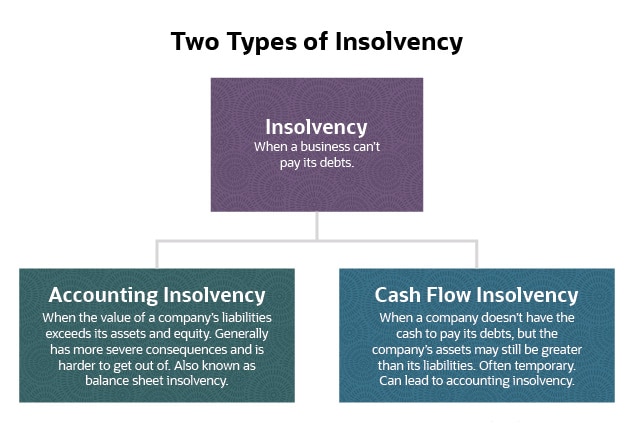The smart Trick of Insolvency Practitioner That Nobody is Discussing
The smart Trick of Insolvency Practitioner That Nobody is Discussing
Blog Article
Getting My Insolvency Practitioner To Work
Table of ContentsSee This Report about Insolvency PractitionerA Biased View of Insolvency PractitionerNot known Details About Insolvency Practitioner Some Known Questions About Insolvency Practitioner.The Insolvency Practitioner IdeasThe 8-Second Trick For Insolvency PractitionerInsolvency Practitioner Can Be Fun For Anyone
Bankruptcy is when obligations are higher than the value of the firm, or when a debtor can not pay the financial obligations they owe. A firm can end up being bankrupt as a result of a number of scenarios that result in inadequate capital. When faced with bankruptcy, an organization or person can get in touch with creditors directly and restructure financial obligations to pay them off.Bankruptcy can cause bankruptcy procedures, in which lawsuit will be taken versus the bankrupt person or entity, and assets may be sold off to pay off arrearages. Company owners might speak to creditors directly and restructure financial debts right into even more convenient installations. Financial institutions are usually open to this strategy because they wish to be paid off and stay clear of losses, also if the repayment is on a postponed timetable.
The smart Trick of Insolvency Practitioner That Nobody is Discussing
The proprietor develops a proposition detailing how the financial obligation may be restructured using cost reductions or other plans for assistance. The proposition reveals financial institutions how the business may generate adequate cash money circulation for successful operations while paying its financial debts. Commonly, a forgiven financial debt may be thought about earnings by the Internal Revenue Service (INTERNAL REVENUE SERVICE).

The 9-Second Trick For Insolvency Practitioner
The organization may wind up paying huge amounts of money in damages and be overcome operations. When operations discontinue, so does the company's earnings. Absence of earnings results in unpaid bills and financial institutions requesting cash owed to them. Some companies become bankrupt because their items or solutions don't develop to fit customers' changing demands.
Expenditures go beyond revenues and expenses stay unsettled. Kinds of bankruptcy include cash-flow insolvency and balance-sheet insolvency. Cash-flow bankruptcy occurs when a company has the possessions to cover their financial obligations but they are in the incorrect type, such as actual estate instead of liquid funds. Balance-sheet insolvency, on the other hand, suggests an absence of properties in any type of kind to cover financial obligations.
The IRS states that an individual is insolvent when the complete responsibilities exceed overall assets. A personal bankruptcy, on the other hand, is an actual court order that illustrates how an insolvent person or service will pay off their lenders, or just how they will sell their properties in order to make the settlements.
Indicators on Insolvency Practitioner You Need To Know

Understanding the variables that can bring about bankruptcy, such as overspending, can assist you avoid insolvency and its repercussions.
The Buzz on Insolvency Practitioner
It is navigate here well known that directors and police officers of companies (and supervisors of restricted responsibility companies) owe fiduciary duties to their companies and their shareholders (or participants). These fiduciary commitments are defined by state statutes and, though there are variations from state to state, they generally include a responsibility of commitment and an obligation of care.
The task of care needs supervisors and officers to work out persistance, to make informed decisions, and to act in excellent belief so that their actions remain in the most effective passion of the company. Beyond the range of this discussion, some states enable these tasks to be restricted either by so keeping in mind in the organizational files or conforming with various other requirements.
Excitement About Insolvency Practitioner
Many states define insolvency in 2 means( 1) when a business's obligations end up being above the amount of its properties or (2) when the business comes to be unable to pay its financial obligations as they come to be dueand accept find this both definitions (Insolvency Practitioner). The change in obligations takes place since when a business is insolvent, there is no value in the firm past that owed to the firm's lenders so that the equity holders no more have a financial stake in the business
Be cautious regarding giving investors find out this here favoritism at the cost of creditors (e.g., licensing and moneying a dividend or a stock redemption). Beware concerning preferential therapy in between classes of shareholders. Make reasonable efforts to learn all the realities before taking a specific strategy; supervisors need to really believe that any type of decisions made are in the most effective rate of interests of the firm in its whole (i.e., choices will certainly be assessed in hindsight in light of the result of such actions on the corporation).
In any type of personal bankruptcy or bankruptcy case, settlements made to specific lenders at the cost of other creditors can be clawed back, especially if there is some link in between the business and the lender. Take into consideration proposing at an annual stockholder meeting (or any type of other conference of stockholders) a resolution attesting that all previous business decisions and activities taken by the supervisors and police officers of the corporation were taken in good confidence after an exercise of sensible treatment.
Insolvency Practitioner for Dummies
Completely divulge any individual or business connections with events on the other side of transactions entailing the company to prevent the appearance of a dispute of passion. In evaluating prospective fund elevating transactions or a sale of properties of the troubled firm, know that these purchases may be inspected later on due to any subsequent development of directors' fiduciary responsibilities to consist of creditors.
Report this page